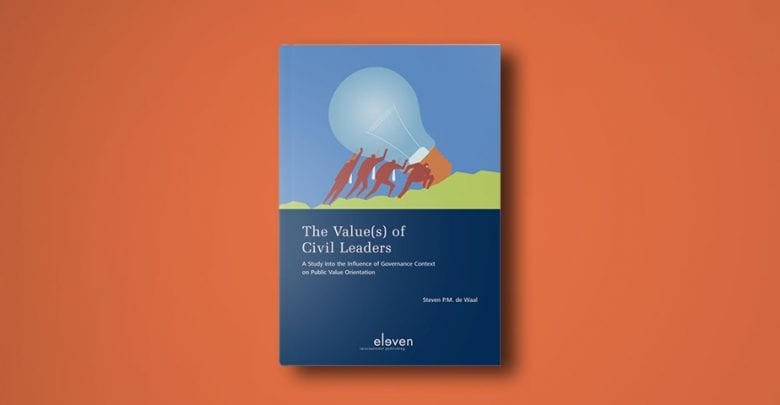BooksPublicationsCivil Leadership
The Value(s) of Civil Leaders (2014)
A Study into the Influence of Governance Context on Public Value Orientation

The importance of civil leaders can hardly be overestimated. They contribute to a better society, mobilize people and resources for good causes or focus attention on urgent problems. Civil leaders work outside government and are personally motivated, thereby exercising public leadership. They come from the ranks of philanthropists, celebrities and volunteers, but may also be directors of non-profit and public organizations or business entrepreneurs.
Civil leaders: a breed of their own
‘The Value(s) of Civil Leaders. A Study into the Influence of Governance Context on Public Value Orientation‘ examines how civil leaders are influenced by their value patterns – both personally and in their societal work. It is the result of a dissertation and academic research by Steven P.M. de Waal with work and research done by Public Space Foundation from 2007 on. It also investigates to what extent the values and leadership style of civil leaders are determined by for-profit, non-profit and informal institutional or governance contexts. The concepts of ‘values’, ‘leadership’, ‘governance’ and ‘public value’ are studied both theoretically and in a comparative case study of thirty Dutch civil leaders and a comparative survey. The inspirational portraits and stories of these leaders presented in the book are also available as pdf. The author shows how the common value patterns of these different civil leaders in their different contexts are characterized by a unique combination of societal and entrepreneurial values, making them indeed a breed of their own.
The Main Results
The main results of this study, which was at the basis of the PhD at RUU (University of Utrecht) of Steven de Waal in October 2014:
1. The dominant value patterns of the three private governance contexts that were distinguished indeed differ substantially. For the ‘Active Citizen‘ – context these were Solidarity, Citizenship and Serving the Public Cause as the most dominant ones. The ‘For Profit‘- governance context has the most typical and specific value pattern, that also matches the most with the theoretically presupposed value patterns in the market segment. It shows two values way ahead of the field: ‘Performance-based’ and ‘Entrepreneurial Spirit’ are the top 2 with scores of over 60% from respondents. The Non-profit context is the most evenly spread range of values, so the least differentiating. Probably because non-profit context is no longer a strong indication of the culture of governance context. It can now range in a wide variety from a culture ‘close’ to civil society or grass root organization to ‘marketlike’, not only social entrepreneurial but even commercial. We can see that in the three dominant values: Responsibility, Entrepreneurial Spirit and Serving the Public Cause. These are values that also have connections with the culture of the other governance contexts and with government context.
2. The other major finding, especially in light of this first one, is that the civil leaders predominantly had a special value pattern of ‘their own’, that deviated substantially from the dominant value patterns per governance context and so, deviated from the specific governance context they operated from. Their top ranked values were Freedom of Choice and Entrepreneurial, Stability and Respect and Solidarity with Self-actualization. With these values it is good to know that ‘freedom of choice’ is not a sign of a market type ideology but mainly to give people, including poor or vulnerable people, the chance to have a personal choice in their lives. And the same is true of ‘Solidarity with Self-Actualization’, because it was based on a ‘help’-culture that was defined by ‘helping people to help themselves’, which means a drive for selfactualization in the way they handled their lives. So they thought their civil leadership had this purpose: to help every person to help him/herself, including vulnerable or poor or weakened people.
3. The civil leaders in the study had some specific defining and common characteristics, of course apart from the fact that they were consciously searched for in the three different private governance contexts:
It was real leadership: a. there was resistance, from the inside and/or from the outside, b. it was really personal in drive, character, values, direction and so not only based on their function or position, they operated beyond the call of duty based on this personal drive and c. followers followed them volunteerily and spontaneous, believing in the public purpose and value of this leadership.
It was really social and civil oriented: there was a specific result reached and obtained in public value and that result was really connected with this personal leadership.
4. There were other results, especially from the description and analysis of their practice as a civil leader, like:
a. They need good public leadership and public exposure to build public trust for the new things they are doing and trying. Because they show leadership they are often outside current routines and habits and need often to prove they are doing the right thing. Especially the formally responsible government executives, both political and administrative, are surprised and often ‘not amused’ about these new ‘unauthorized’ experiments in ‘their’ public domain or public services.
b. They need their personal and public passion to convince their personnel or professionals that this direction is the right way to go. Their personal ambition is the most convincing part (as is also part of rhetorical theory, in which it is called ‘Ethos’, the authority that comes from personal background, knowledge and interest). The whole organization of course can have severe doubts, often strenghtened by government interference, if what the civil leader wants is allowed or legal or part of their public trust or even the current public financial arrangement.
c. The civil leaders operated in several institutional roles. The study distinguished between executives (who from their formal position operated outside their official mandate or tasks, you could say they were ‘operating beyond their duty’), societal pioneers (who did totally new things, either from a civil society background or in their institutional field of comparable organizations) and challengers (who challenged convincingly current laws and regulations, mostly as the formal restructions that are based on the past, not the future or the urgent societal needs they observed). This makes this leadership very personal. All three types had to struggle with formal requirements that come with the job or social routines and normal expectations about their role and purposes as civil leaders. Behind their wish to innovate and increase public value there could even be a struggle with their governance context.
The basic definition based on their leadership, the public result they reached and their values orientation made me define them as prominent citizens. This means that I saw the necessary culture in boardrooms, with civil leaders who have an executive position, as citizenship in the boardroom.
Society must acknowledge that they cannot do without virtuous men and women. The study found many, so it still is current practice in all kinds of fields where there is a societal need for change. But at the same time, as always in leadership, it was not easy to find and select them and to investigate their leadership in practice, because on a personal level it is alway an exception to find these kind of real leaders that have reached a new public value as was the main focus in this study.
Steven P.M. de Waal, The Value(s) of Civil Leaders, Eleven International Publishers, The Hague, 2014.


